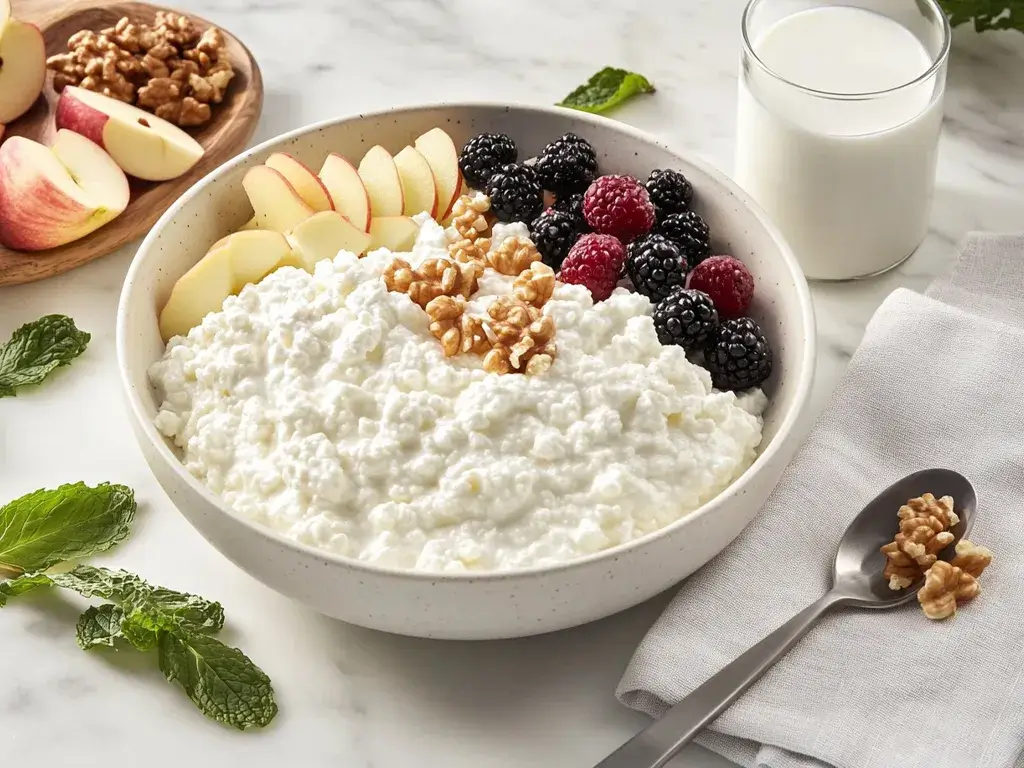How many times a week should you eat cottage cheese? This is a common question among health-conscious individuals looking to maximize the benefits of this nutrient-rich dairy product. When it comes to healthy eating, few foods strike the perfect balance between taste, versatility, and nutritional benefits like cottage cheese. This dairy favorite has stood the test of time, earning its spot as a staple in households worldwide.
For more inspiration on incorporating cottage cheese into your meals, explore these delicious cottage cheese recipes. In this article, we will explore its fascinating history, its impressive nutritional profile, and why it continues to charm food lovers across the globe.
Table of Contents
Introduction to Cottage Cheese
Cottage cheese has long been a favorite in kitchens worldwide, known for its creamy texture and rich nutritional benefits. It’s a versatile dairy product that can be enjoyed on its own, paired with fruits, or incorporated into savory dishes. This introduction delves into its origins, nutritional profile, and growing popularity among health-conscious individuals.
What Is Cottage Cheese?
Cottage cheese is a fresh cheese made from the curds of pasteurized cow’s milk. It’s typically produced by adding an acid or rennet to milk, which causes the milk solids to separate from the liquid whey. The resulting curds are then drained, washed, and sometimes mixed with cream to enhance the texture and flavor. Unlike aged cheeses, cottage cheese doesn’t undergo a ripening process, which gives it its mild taste and soft consistency.
Historically, cottage cheese dates back to ancient times, with its roots traced to early European farming communities. Its name originates from the practice of making this cheese in small batches at home or in cottages, hence the name “cottage cheese.” Today, it’s a staple in many diets due to its simplicity and adaptability in recipes.
Nutritional Profile of Cottage Cheese
One of the standout features of cottage cheese is its impressive nutritional profile. It’s particularly prized for its high protein content, making it a go-to food for athletes, bodybuilders, and anyone looking to increase their protein intake. A typical half-cup serving of low-fat cottage cheese contains approximately:
| Nutrient | Amount (per 100g) |
|---|---|
| Protein | 11-12g |
| Calcium | 8-10% of RDI |
| Calories | 90-120 kcal |
| Fat | 4-5g |
| Carbohydrates | 3-4g |
| Sodium | 15-20% of RDI |
These nutritional attributes make it a nutrient-dense food that fits seamlessly into various dietary patterns, from low-carb to high-protein diets.
Why Is Cottage Cheese a Popular Dietary Choice?
Cottage cheese has become a household favorite, not just for its taste but also for its health benefits. Its high protein content helps promote muscle repair and growth, making it a favorite among fitness enthusiasts. Additionally, the calcium in cottage cheese supports strong bones and teeth, while its relatively low calorie count makes it a great option for those aiming to manage their weight.
Another reason for its popularity is its versatility. Cottage cheese can be eaten at any time of the day—as a quick breakfast with fruits, a protein-rich snack, or even a creamy ingredient in savory dishes like lasagnas or casseroles. Its mild flavor pairs well with both sweet and savory ingredients, making it a culinary chameleon.
Moreover, cottage cheese contains probiotics, beneficial bacteria that support gut health. These qualities, combined with its affordability and wide availability, contribute to its enduring appeal.
In summary, cottage cheese is more than just a simple dairy product. It’s a nutrient-packed, versatile, and accessible food that continues to win hearts and stomachs across the globe. Whether you’re looking for a quick snack or a key ingredient for your recipes, cottage cheese has something to offer for everyone.
Health Benefits of Eating Cottage Cheese

Cottage cheese isn’t just a versatile ingredient in the kitchen; it’s also a powerhouse of health benefits. From supporting muscle growth to improving bone health, this humble dairy product offers a wide array of advantages for your body. Let’s explore how incorporating cottage cheese into your diet can boost your overall well-being.
High Protein Content for Muscle Growth
Protein is the building block of muscles, and cottage cheese is loaded with it. A typical serving provides approximately 11 to 12 grams of high-quality protein, containing all essential amino acids needed for muscle repair and growth. This makes cottage cheese a favorite among athletes, fitness enthusiasts, and anyone looking to increase their protein intake without consuming excessive calories.
The casein protein in cottage cheese digests slowly, making it an excellent option for maintaining muscle synthesis over extended periods, such as overnight. Adding it to your post-workout meal or evening snack can help your muscles recover and grow while you rest.
Calcium for Bone Health
Strong bones need a consistent supply of calcium, and cottage cheese delivers just that. A serving provides around 8-10% of your daily recommended intake (RDI) of calcium. This mineral is crucial for maintaining bone density, preventing osteoporosis, and ensuring proper function of nerves and muscles.
Calcium isn’t just for older adults; it’s essential at every stage of life. Whether you’re a growing child, an active adult, or entering your senior years, the calcium in cottage cheese can help keep your bones strong and healthy.
Probiotics and Digestive Support
Some varieties of cottage cheese are enriched with probiotics—live bacteria that support a healthy gut microbiome. These beneficial bacteria improve digestion, enhance nutrient absorption, and may even boost your immune system.
While not all cottage cheeses contain probiotics, those that do can be especially valuable for individuals experiencing digestive issues or those looking to maintain optimal gut health. Always check the label for “live and active cultures” to ensure you’re getting probiotic benefits.
Weight Management and Satiety
Cottage cheese is a weight-loss-friendly food, thanks to its high protein content and low calorie count. Protein is known to promote feelings of fullness, reducing the likelihood of overeating and helping with portion control. A single serving of cottage cheese can keep hunger at bay while providing the nutrients your body needs.
Incorporating cottage cheese into your meals can also help maintain a balanced diet. Its versatility allows it to be paired with fresh fruits, vegetables, or whole grains, creating a nutritious and satisfying dish. For those on low-carb or ketogenic diets, cottage cheese is an ideal option to meet protein needs without exceeding carb limits.
In conclusion, cottage cheese is more than a simple snack or recipe ingredient. Its health benefits, ranging from muscle growth and bone health to digestive support and weight management, make it a nutritional superstar. Adding cottage cheese to your diet a few times a week can be a delicious and effective way to support your health goals.
Factors Influencing Cottage Cheese Consumption

Cottage cheese is a nutrient-rich food, but the amount and frequency of consumption can vary depending on several personal and physiological factors. These include dietary goals, lactose tolerance, and specific nutritional needs tied to different life stages. Understanding these influences can help individuals make informed decisions about incorporating cottage cheese into their diets.
Individual Dietary Needs and Goals
Everyone’s dietary requirements are unique, influenced by factors such as activity level, health objectives, and overall nutritional balance. Cottage cheese is a highly versatile food that fits into a range of dietary plans:
- For Athletes and Fitness Enthusiasts: The high protein content makes cottage cheese ideal for muscle repair and growth. Consuming it as a post-workout snack or before bed ensures sustained protein synthesis due to its slow-digesting casein protein.
- For Weight Loss: Cottage cheese is low in calories but high in satiety-promoting protein. This makes it a fantastic choice for those looking to manage or reduce their weight without sacrificing essential nutrients.
- For Balanced Diets: Its nutrient profile complements various eating patterns, including low-carb, high-protein, and Mediterranean diets. Cottage cheese can easily pair with fruits, vegetables, or whole grains to create a balanced meal.
Ultimately, the amount of cottage cheese consumed each week will depend on individual caloric needs and dietary preferences.
Lactose Sensitivity and Alternatives
Cottage cheese is made from cow’s milk, which contains lactose, a natural sugar that some individuals may find difficult to digest. While the fermentation process reduces lactose levels, it’s not entirely removed. For those with mild lactose intolerance, small servings of cottage cheese may be tolerable. However, individuals with more severe lactose sensitivity or allergies might need alternatives.
Alternatives to Traditional Cottage Cheese:
- Lactose-Free Cottage Cheese: Many brands now offer lactose-free options, ensuring that individuals with lactose intolerance can enjoy the same nutritional benefits without discomfort.
- Plant-Based Substitutes: For those avoiding dairy altogether, plant-based cottage cheese alternatives made from ingredients like tofu or almonds are available. While these options may differ in texture and taste, they often provide comparable nutritional value.
Checking labels for lactose content and exploring alternatives can help ensure that dietary restrictions don’t compromise nutritional goals.
Age and Nutritional Requirements
Cottage cheese can be a valuable addition to the diet at any stage of life, but the reasons for consuming it may differ based on age-related nutritional needs:
- For Children and Adolescents: Growing bodies require ample protein and calcium, both of which cottage cheese provides. Including it in snacks or meals can support bone development and muscle growth.
- For Adults: Active adults benefit from its muscle-repair properties, while its low-calorie profile aids in maintaining a healthy weight.
- For Seniors: As bone density naturally declines with age, the calcium in cottage cheese becomes especially important. Additionally, its soft texture makes it easy to consume for individuals with dental challenges.
By understanding the interplay of these factors, individuals can better tailor their cottage cheese consumption to meet their unique dietary and health needs. This thoughtful approach ensures maximum benefits while accommodating personal preferences and restrictions.
How Many Times a Week Should You Eat Cottage Cheese? Finding the Right Balance

Determining how many times a week to eat cottage cheese depends on your personal health goals, activity levels, and nutritional needs. While there is no one-size-fits-all answer, general recommendations can help you decide how often to include this nutritious food in your diet.
General Recommendations for Adults
For most adults, consuming cottage cheese 3 to 5 times per week is an excellent way to reap its benefits without overdoing it. This frequency allows you to enjoy its high protein content, calcium, and probiotics while maintaining variety in your diet. Here are some considerations:
- Balanced Diets: Eating cottage cheese alongside a diverse range of foods ensures you get all necessary nutrients. Pairing it with fruits, vegetables, or whole grains can enhance its nutritional value.
- Meal Versatility: Cottage cheese can be incorporated into different meals, such as breakfast bowls, savory lunches, or as a creamy side for dinner.
- Moderation: While it’s a nutrient-dense food, overconsumption can lead to high sodium intake. Sticking to moderate servings (about ½ cup per portion) is advisable.
Guidelines for Athletes and Active Individuals
Athletes and those with high activity levels may benefit from eating cottage cheese more frequently, up to daily. The slow-digesting casein protein in cottage cheese is particularly useful for muscle recovery and growth. Consider these scenarios:
- Post-Workout Nutrition: Cottage cheese provides a quick source of protein to support muscle repair after intense exercise.
- Evening Recovery: Consuming cottage cheese before bed helps sustain protein synthesis overnight, aiding in muscle repair and growth during sleep.
- Caloric Considerations: For those with higher caloric needs, pairing cottage cheese with calorie-dense foods like nuts or granola can create a well-rounded snack.
Advice for Weight Loss or Maintenance Goals
Cottage cheese is an ideal food for those looking to lose or maintain weight. Eating it 2 to 4 times a week can help curb hunger and support weight management:
- High Satiety: Its high protein content keeps you feeling full longer, reducing the likelihood of overeating.
- Low-Calorie Option: Cottage cheese offers essential nutrients without adding unnecessary calories.
- Creative Pairings: Pair it with low-calorie foods like cucumbers, tomatoes, or mixed greens to create satisfying meals that support weight loss.
Special Considerations for Children and Seniors
Children and seniors have unique nutritional needs, and cottage cheese can play an important role in their diets:
- For Children: Growing kids benefit from the protein and calcium in cottage cheese, which support bone development and muscle growth. Including it 3 times a week in meals or snacks is a practical choice.
- For Seniors: As aging can lead to reduced appetite and decreased bone density, cottage cheese’s nutrient density makes it a valuable addition. Seniors may consume it 2 to 3 times a week, prioritizing low-sodium options to support heart health.
In summary, cottage cheese can be tailored to fit a variety of lifestyles and dietary needs. Whether you’re aiming to build muscle, manage weight, or meet specific nutritional requirements, adjusting your consumption frequency ensures you enjoy its benefits without overindulging.
Risks of Overeating Cottage Cheese
Cottage cheese is undeniably nutritious, but consuming it in excessive quantities can lead to some health concerns. Understanding these potential risks helps ensure that it remains a healthy addition to your diet without unintended side effects.
Sodium Content and Its Effects
One of the primary concerns with overeating cottage cheese is its sodium content. Many commercial varieties contain a significant amount of salt, which acts as a preservative and enhances flavor. While sodium is essential for bodily functions like fluid balance and nerve signaling, excessive intake can have adverse effects, such as:
- High Blood Pressure: Consistently high sodium consumption can contribute to elevated blood pressure levels, increasing the risk of heart disease and stroke.
- Water Retention: Consuming too much sodium may cause bloating and water retention, which can be uncomfortable for some individuals.
For those on a low-sodium diet or managing conditions like hypertension, choosing reduced-sodium cottage cheese or moderating portion sizes can mitigate these risks.
Potential Allergic Reactions
Although rare, some individuals may experience allergic reactions to cottage cheese. These reactions are typically due to:
- Milk Proteins: Cottage cheese contains casein and whey, common allergens that can cause symptoms like skin rashes, hives, digestive distress, or in severe cases, anaphylaxis.
- Additives or Preservatives: Certain brands may include stabilizers or preservatives that can trigger sensitivities or allergic reactions in some people.
If you suspect an allergy, it’s best to consult with a healthcare professional and avoid consuming cottage cheese until confirmed safe.
Impact on Kidney Health in Excessive Quantities
Cottage cheese is high in protein, which is beneficial for muscle growth and repair. However, consuming excessive amounts of protein-rich foods can place strain on the kidneys, particularly for individuals with pre-existing kidney conditions. Potential issues include:
- Increased Workload on Kidneys: High protein intake may lead to the overproduction of waste products like urea, which the kidneys must filter out.
- Calcium Loss: Excessive dietary protein has been associated with increased calcium excretion through urine, potentially impacting bone health over time.
Healthy individuals are unlikely to experience kidney problems from moderate cottage cheese consumption. However, those with kidney concerns should monitor their protein intake and consult a healthcare provider for guidance.
Frequently Asked Questions
What can I mix with cottage cheese?
Cottage cheese is a culinary chameleon that pairs well with both sweet and savory ingredients. For a sweet twist, mix it with fresh fruits like berries, bananas, or pineapple. If you prefer savory, try combining it with chopped vegetables like cucumbers, cherry tomatoes, or bell peppers. Adding herbs and spices, such as dill, chives, or a sprinkle of paprika, can enhance its flavor. Don’t forget crunchy toppings like nuts, seeds, or granola for added texture. Learn more
What is the most popular way to eat cottage cheese?
The most popular way to eat cottage cheese is as a quick, high-protein snack or breakfast. Many enjoy it with fruits like peaches or strawberries for a naturally sweet and satisfying combination. It’s also commonly served on toast, in smoothies, or as a topping for baked potatoes. The simplicity of adding honey or a dollop of jam makes it a favorite for those with a sweet tooth. Learn more
What meat to pair with cottage cheese?
Cottage cheese pairs exceptionally well with lean meats like grilled chicken, turkey, or smoked salmon. These combinations create balanced meals packed with protein. For a savory snack, you can enjoy cottage cheese alongside slices of ham or turkey rolled up in lettuce wraps. Additionally, it works well as a topping for burgers or as a side for steak, adding a creamy and nutritious touch. Learn more
Can I eat cottage cheese every day?
Yes, you can eat cottage cheese daily, provided you balance it with other nutrient-dense foods. Its high protein content makes it an excellent daily addition to support muscle repair and satiety. Opt for low-sodium varieties to avoid overconsuming sodium.
How does cottage cheese fit into a low-carb diet?
Cottage cheese is a fantastic choice for a low-carb diet, as it’s low in carbohydrates and high in protein. It can be paired with low-carb vegetables, avocado, or nuts to create filling and nutritious meals that align with ketogenic or low-carb eating plans.
What’s the best time of day to eat cottage cheese?
Cottage cheese can be enjoyed at any time of the day. In the morning, it’s perfect for breakfast bowls with fruits and granola. For a midday snack, it provides a quick source of energy. At night, its slow-digesting casein protein makes it a great choice for promoting muscle recovery during sleep.
Conclusion
Cottage cheese is a nutritional powerhouse that fits seamlessly into various diets and lifestyles. From its high protein content to its rich calcium levels, this dairy delight offers numerous health benefits. Whether you’re seeking to build muscle, manage your weight, or simply enjoy a versatile ingredient, cottage cheese has something for everyone.
By consuming it in moderation—typically 3 to 5 times a week—and pairing it with complementary foods, you can maximize its benefits without overindulging. Remember to choose varieties that align with your dietary needs, such as low-sodium or lactose-free options.
Incorporating cottage cheese into your meals doesn’t have to be complicated. With so many ways to enjoy it, from sweet to savory dishes, it’s no wonder cottage cheese continues to be a popular choice for health-conscious individuals. Start experimenting with your favorite combinations today and discover how this simple food can elevate your diet!






